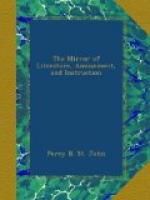From severe suffering of the head in many fevers a great inroad is frequently made upon the memory, and it is long before the convalescent can rightly put together all the ideas of his past life. Such was one of the effects of the plague at Athens, as we learn from Thucydides; “and many, on recovery, still experienced such any extraordinary oblivion of all things that they knew neither themselves nor their friends.” A few years ago a man with a brain-fever was taken into St. Thomas’s Hospital, who as he grew better spoke to his attendants, but in a language they did not understand. A Welsh milk-woman going by accident into the ward, heard him, answered him and conversed with him. It was then found that the patient was by birth a Welshman, but had left his native land in his youth, forgotten his native dialect, and used English for the last thirty years. Yet, in consequence of this fever he had now forgotten the English tongue, and suddenly recovered the Welsh.
Boerhaave, however, gives a still more extraordinary instance of oblivion in the case of a Spanish tragic author who had composed many excellent pieces, but so completely lost his memory in consequence of an acute fever, that he forgot not only the languages he had formerly learnt, but even the alphabet; and was hence under the necessity of beginning to read again. His own poems and compositions were shown to him, but he could not he persuaded that they were his production. Afterwards, however, he began once more to compose verses; which had so striking a resemblance to his former writings that he at length became convinced of his being the author of them.—From the Doctor.
* * * * *
READING COINS IN THE DARK.
(From Sir David Brewster’s Letters on Natural Magic.)
Among the numerous experiments with which science astonishes and sometimes even strikes terror into the ignorant, there is none more calculated to produce this effect than that of displaying to the eye in absolute darkness the legend or inscription upon a coin. To do this, take a silver coin, (I have always used an old one,) and after polishing the surface as much as possible, make the parts of it which are raised rough by the action of an acid, the parts not raised, or those which are to be rendered darkest, retaining their polish. If the coin thus prepared is placed upon a mass of red hot iron, and removed into a dark room, the inscription upon it will become less luminous than the rest, so that it may be distinctly read by the spectator. The mass of red hot iron should be concealed from the observer’s eye, both for the purpose of rendering the eye fitter for observing the effect, and of removing all doubt that the inscription is really read in the dark, that is, without receiving any light, direct or reflected, from any other body. If, in place of polishing the depressed parts, and roughening its raised parts,




